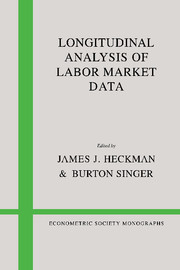Book contents
- Frontmatter
- Part I. Econometric studies
- Part II. Statistical studies
- 5 Weighting, misclassification, and other issues in the analysis of survey samples of life histories
- 6 Statistical models for longitudinal labor market data based on counting processes
- 7 Assessing qualitative features of longitudinal data
- Part III. Sociometric studies
- Name Index
- Subject Index
7 - Assessing qualitative features of longitudinal data
Published online by Cambridge University Press: 05 January 2013
- Frontmatter
- Part I. Econometric studies
- Part II. Statistical studies
- 5 Weighting, misclassification, and other issues in the analysis of survey samples of life histories
- 6 Statistical models for longitudinal labor market data based on counting processes
- 7 Assessing qualitative features of longitudinal data
- Part III. Sociometric studies
- Name Index
- Subject Index
Summary
Introduction
Most empirical analyses of discrete choice processes in economics utilize classes of models which are partially based on economic theory but which also contain disturbance terms and unobserved individual-specific sources of heterogeneity that are described by ad hoc parametric families of distributions. The primary focus of interest in such studies is usually the estimation and interpretation of structural parameters, some of which may be associated with unobserved variables. The fine-grained characteristics of error terms are not generally of central importance, and their principal role is to facilitate estimation of what are interpreted as structural parameters. Unobserved variables are incorporated in models of choice processes for at least two reasons: (1) to reduce bias in estimates of parameters associated with observed variables and (2) because some characteristic, such as the variance, of an unobserved variable plays a critical role in behavioral interpretations of a system of equations.
Strong a priori parametric assumptions about error distributions or the distributions of unobserved variables which are not grounded in economic theory or previous empirical studies can lead to a variety of incorrect conclusions. Among the more prominent negative consequences of this form of model misspecification are the following:
Estimates of structural parameters in a heterogeneous population model can be very sensitive to the choice of a distribution of unobserved variables (Heckman and Singer, 1982a,b). In particular, even the signs of key parameters can be a consequence of these choices.
Rejection of a class of heterogeneous population models based on a test where a “flexible” parametric family of distributions of an unobserved variable are imposed in the models can be an unnecessary erroneous conclusion. For example, mixtures of Bernoulli trials in which beta distributions represent the distribution of binary choices may fail to describe observed data on actual choices. Nevertheless, this data may be represented by some mixture of Bernoulli trials. This possibility is a consequence of the fact that beta mixtures of Bernoulli trials are not dense in the set of all such mixtures.
- Type
- Chapter
- Information
- Longitudinal Analysis of Labor Market Data , pp. 308 - 324Publisher: Cambridge University PressPrint publication year: 1985



